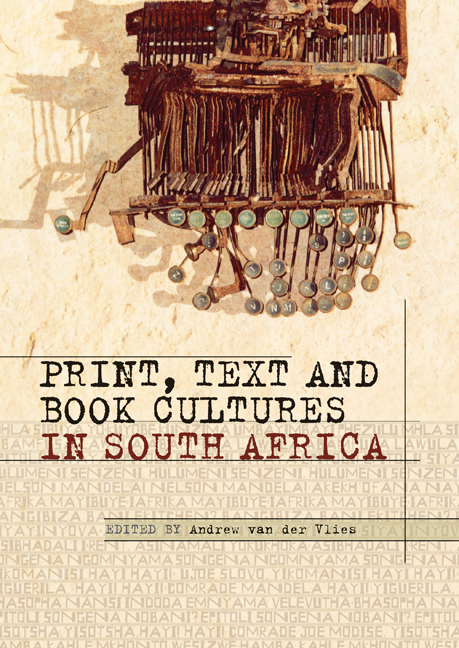Book contents
- Frontmatter
- Contents
- Acknowledgements
- Abbreviations and acronyms
- 1 Introductory
- 2 Print Cultures and Colonial Public Spheres
- 3 Local/Global: South African Writing and Global Imaginaries
- 4 Three Ways of Looking at Coetzee
- 4.1 In (or From) the Heart of the Country: Local and Global Lives of Coetzee's Anti-pastoral
- 4.2 Under Local Eyes: The South African Publishing Context of J. M. Coetzee's Foe
- 4.3 Limber: The Flexibilities of Post-Nobel Coetzee
- 5 Questions of the Archive and the Uses of Books
- 6 Orature, Image, Text
- 7 Ideological Exigencies and the Fates of Books
- 8 New Directions
- Contributors
- Index
4.3 Limber: The Flexibilities of Post-Nobel Coetzee
from 4 - Three Ways of Looking at Coetzee
Published online by Cambridge University Press: 21 April 2018
- Frontmatter
- Contents
- Acknowledgements
- Abbreviations and acronyms
- 1 Introductory
- 2 Print Cultures and Colonial Public Spheres
- 3 Local/Global: South African Writing and Global Imaginaries
- 4 Three Ways of Looking at Coetzee
- 4.1 In (or From) the Heart of the Country: Local and Global Lives of Coetzee's Anti-pastoral
- 4.2 Under Local Eyes: The South African Publishing Context of J. M. Coetzee's Foe
- 4.3 Limber: The Flexibilities of Post-Nobel Coetzee
- 5 Questions of the Archive and the Uses of Books
- 6 Orature, Image, Text
- 7 Ideological Exigencies and the Fates of Books
- 8 New Directions
- Contributors
- Index
Summary
“THE BLOW” AND THE NEW YORKER: NEGOTIATING AN AMERICAN MEDIASCAPE
In the 27 June 2005 issue of The New Yorker, perhaps the most avowedly metropolitan of American periodicals, an extended excerpt from J.M. Coetzee's then-forthcoming novel, Slow Man, published later that year in Britain and America, appeared under the title “The blow”. While Coetzee's contributor's bio at the front of the issue announces the arrival of the novel in September, the excerpt itself—it is taken from the first 14 chapters of the book—is presented as an autonomous long short story and one that is substantially and silently edited for style and length. The contributor's bio also notes Coetzee's Nobel laureate status (awarded 2003), but makes no mention of his nationality or his migration to Australia in 2002.
The New Yorker is perhaps better known for its sophisticated wit and metropolitan sensibility than for engagements with or even hosting of the kind of fiction one might now describe as Coetzeean, thinking specifically of his works’ formal and narrative complexity, although not his Nobel laureate status; Nadine Gordimer has been a frequent contributor to The New Yorker since 1951, long before her own Nobel, and has continued to publish in the magazine since then (the magazine has also published a number of other Nobel literature laureates). The promotion in 2002 of Deborah Treisman to the post of fiction editor (previously occupied by Bill Buford) was seen by many as signalling a shift away from what had appeared to be the magazine's focus on largely male, white and American fiction writers to a more inclusive international field (Frizelle 2005).
Apart from Gordimer, no other major South African writer before Coetzee had ever published fiction in the magazine (although a few have had their work reviewed in its pages).3 The magazine did, however, publish Dan Jacobson's story “A long way from London” (about a South African expatriate living in London) in 1955, and in 1999 published Breyten Breytenbach's poem “Une vie sans ailleurs”, translated by former American poet laureate Rita Dove. It has also published non-fiction by the white ex-Zimbabwean writer Alexandra Fuller.
- Type
- Chapter
- Information
- Print, Text and Book Cultures in South Africa , pp. 208 - 224Publisher: Wits University PressPrint publication year: 2012



